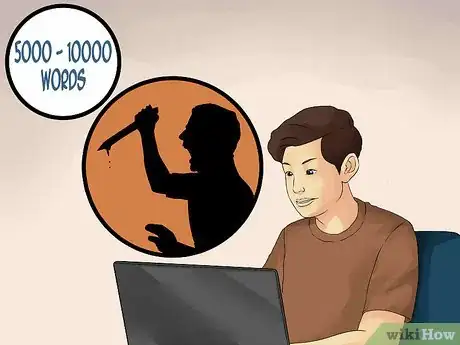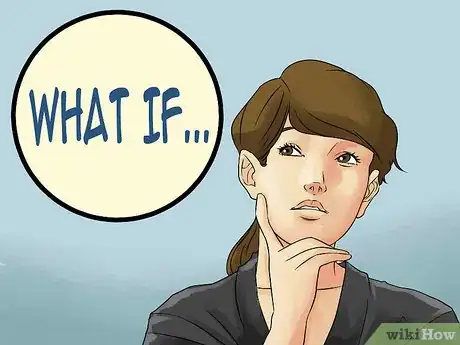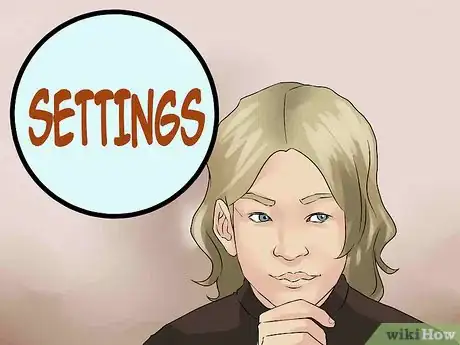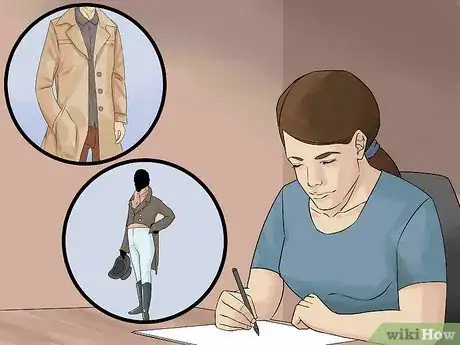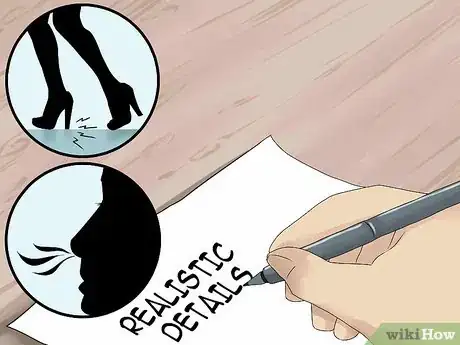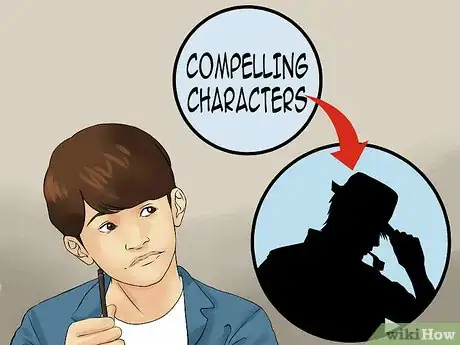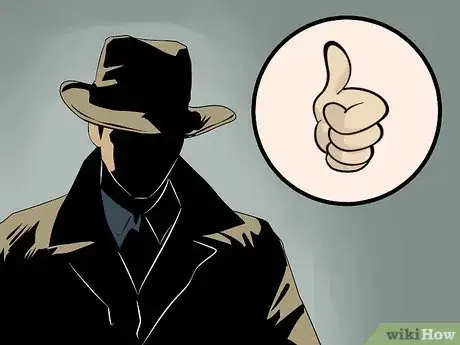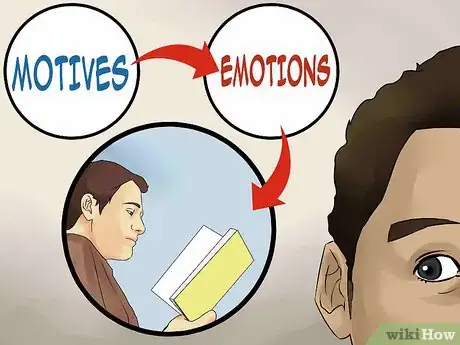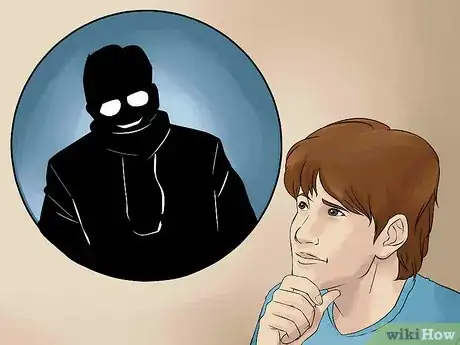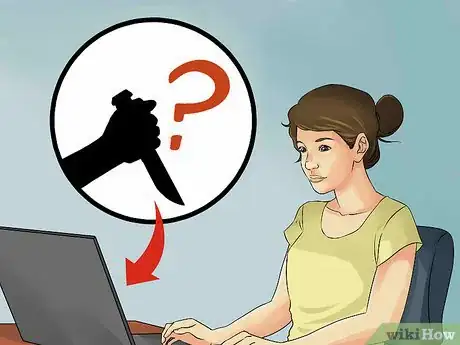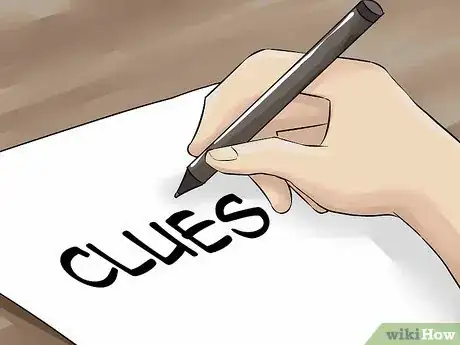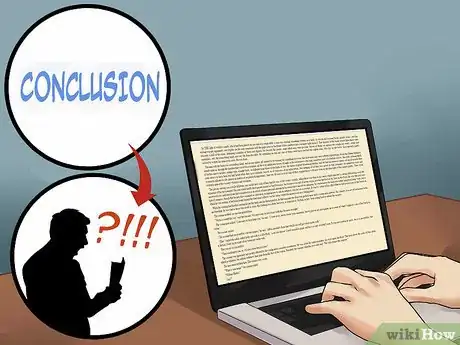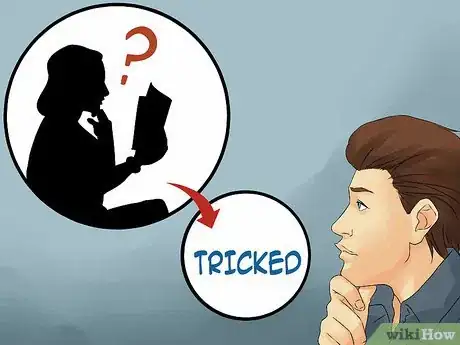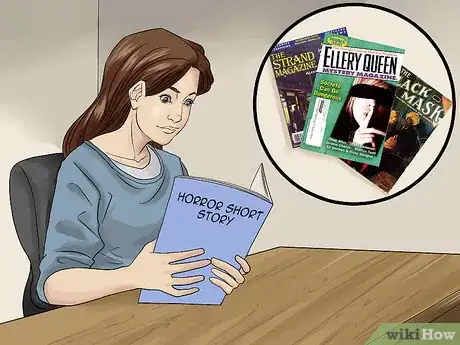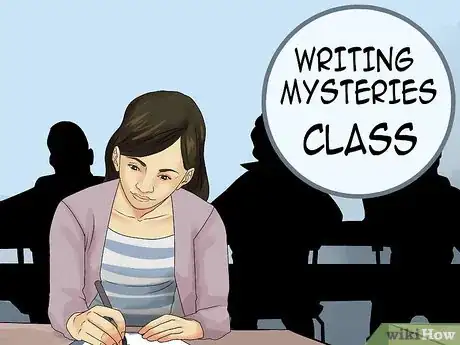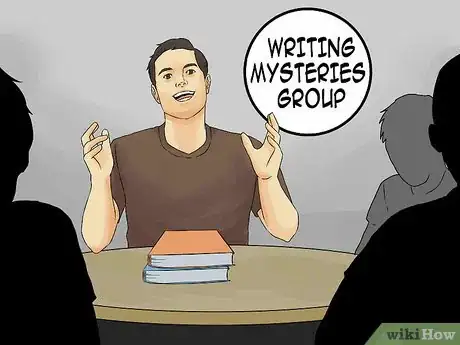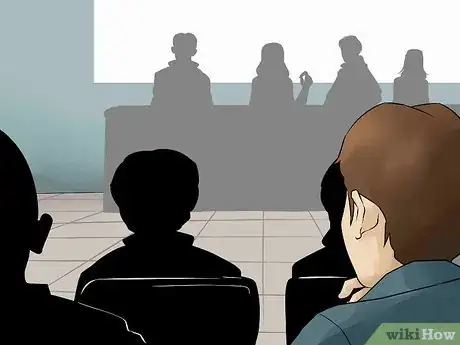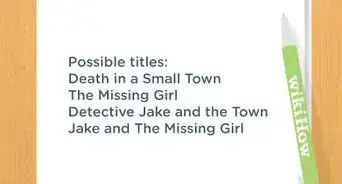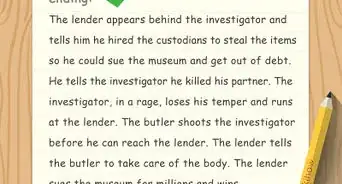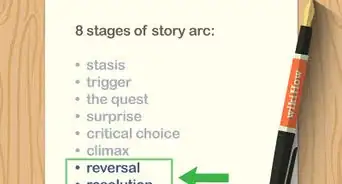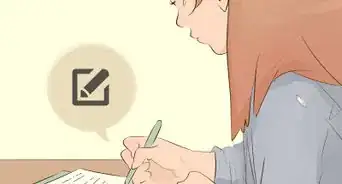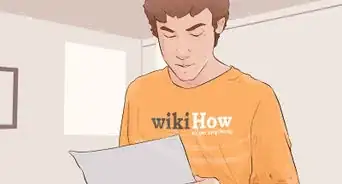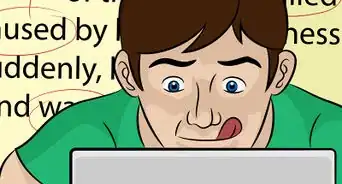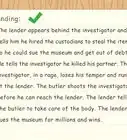This article was co-authored by Lucy V. Hay. Lucy V. Hay is an author, script editor and blogger who helps other writers through writing workshops, courses, and her blog Bang2Write. Lucy is the producer of two British thrillers and her debut crime novel, The Other Twin, is currently being adapted for the screen by Free@Last TV, makers of the Emmy-nominated Agatha Raisin.
There are 8 references cited in this article, which can be found at the bottom of the page.
This article has been viewed 46,155 times.
If you want to write a short story that really captures your audience, you might want to try writing a mystery. While you will find that the conclusion to your mystery is the most important part to creating a great story, it is critical to pay attention to the minute details and clues along the way.
Steps
Writing Your Mystery
-
1Know the scope of your story. A short story is usually between 5,000 and 10,000 words, but may be as long as 20,000 words (80 pages, double-spaced). The author H.G Wells said that it's a short story if you can read it in half an hour. To write a mystery within this limited space means that you'll have to make every word count. Furthermore, you'll have to make sure your mystery short story includes these elements:
- A crime of some sort, usually a murder.
- A sleuth or detective.
- A criminal.
- Clues that the writer will drop along the way for the sleuth to find.
- The other elements of a short story include: location (or setting); time period; dialogue; character development. These are also present in the mystery short story.
-
2Determine the crime. Most often, mystery stories are centered around a crime of some sort.[1] The crime, and the solving of that crime, is the central plot point of the mystery novel.
- To think of your crime, you may find it beneficial to ask yourself "What if...?" questions. For example, "What if...there an unexplained murder in the house?" "What if...someone went missing unexpectedly?"
- You can often find ideas for your mystery story in news headlines or daily activities. If you're writing a historical mystery, you might find yourself intrigued by unsolved mysteries of the past.
- Once you start to generate "What if...?" questions, you may find it difficult to stop!
Advertisement -
3Choose a setting for your story. Your setting should be described in sufficient detail that the reader has a clear mental image of the location, whether it's a lady's parlor or a battlefield. Your mystery short story may be set in one room, one house, one city, or around the world; regardless, make sure that you provide a detailed and vivid description of the setting for your mystery short story.
- Recognize that the size of the place will influence the development of your story. For example, in a large city or busy public place, you will have lots of opportunities to introduce witnesses. However, in a “locked-room mystery” (one where all the characters seem to be present in the same room throughout the occurrence of the crime), you will likely have no external witnesses, but may be able to draw upon your characters opinions and biases of each other.
- Focus on the elements of your setting that are essential to the story. For example, is weather essential? If it is, write about it in great detail. If it is not, only mention it briefly or leave it out altogether.
-
4Set a time period. Does your mystery story occur in the modern day, or in a historical era? Deciding on a set time period for your mystery short story will enable you to include period-specific clues (such as what characters might be wearing or what their occupations may be). This will help with the development of detail in your mystery short story.[2]
- A short story won't have a lot of time to spend describing historical detail. If your setting requires a lot of explanation, consider using a longer form.
- Be prepared to do all the necessary research to make your setting compelling and realistic to the reader.
-
5Include realistic details. The surprise of the mystery story is enhanced by the realistic setting and details that the reader can easily place and recognize. For example, if your mystery story takes place in a school, include convincing details: the smell and taste of chalk dust; the sound of a teacher's high heeled shoes; the rusty taste of the locker that the detective is hiding inside.[3]
- You can use these details to establish setting, offer clues, and make characters more realistic.
- Because you're writing a short story, make sure each detail functions in at least 2 of these ways.
-
6Create compelling characters. In a mystery, you'll want to make sure each character is both realistic and easily identifiable. Make sure their names are distinct, that each has uniquely identifying features, and that they have ways of acting or speaking that are unique.[4]
- Some characters should be potential suspects for having committed the crime (and at least one should actually be guilty of the crime), some should be supporting characters that serve to make the storyline interesting (a love interest or meddling mother-in-law, perhaps), and one (or more) should be focused on solving the mystery.
- Well-written characters will have motives for acting in ways that further the plot.
-
7Describe your sleuth. Your detective should be interesting, with a strong personality. Think of the detectives you've read in other stories: each one of them has a strong personality, a signature style, and a unique outlook on life. Usually, a mystery story is told from the detective's point of view.[5]
- Keep track of all the traits of your sleuth. Know his or her personality, physical characteristics, tendencies, habits, best and worst qualities, and signature style (among other things). Even if you don’t reveal all of her characteristics to the reader, it is important to be consistent throughout your short story.
- Consider developing your sleuth around yourself or around someone you know. This can help you decide on certain features and traits that will result in a thorough description of your sleuth.
- Think about including weaknesses and foibles.[6] While you may want your sleuth to have superhero-like mental capacity or razor sharp intuition, there might be some things that they struggle with as well.[7] This will make your character more relatable to your readers.
- Ensure that your sleuth is unique. If you have trouble determining this, think about what makes you unique and add some of that character into the character of your sleuth.
-
8Consider motives and emotions. What is the sleuth's reason for wanting to solve the mystery? What was the villain's reason for committing the crime? If your answer is only "money", your reader is unlikely to be interested enough to continue to read.[8]
- Remember that your reader is not getting paid to read your story, so your reader must also have an emotional investment to continue to read.
- A good sleuth will have an investment that gives him motivation to go above and beyond the standard nature of the job. He should have a deeply personal connection to solving the crime.
EXPERT TIPLucy V. Hay is an author, script editor and blogger who helps other writers through writing workshops, courses, and her blog Bang2Write. Lucy is the producer of two British thrillers and her debut crime novel, The Other Twin, is currently being adapted for the screen by Free@Last TV, makers of the Emmy-nominated Agatha Raisin.Professional Writer
 Lucy V. Hay
Lucy V. Hay
Professional WriterGo beyond a typical "whodunit" to add a surprising twist. Author Lucy Hay says: "Sometimes your mystery might be about figuring out who's done a crime, but other times, you might reveal that right away. Then, the goal would be to discover why they've done it, instead."
-
9Consider your antagonist or villain. Who is the “bad guy” (or gal) in your mystery short story? To add some extra spice to your story, you may want to consider presenting a few potential villains with suspicious characteristics. This will leave your reader guessing as to who is the real antagonist in your story.[9]
- Describe your villain well, but not too well. You don’t want your reader to guess right from the beginning of the story who is the culprit. Your reader may become suspicious if you spend a disproportionate amount of time describing one character.
- You may want to make your villain someone that has been slightly suspicious all along. On the other hand, you may want to make the revelation of the culprit or criminal a complete shock. “Framing” someone throughout the story is a surefire way to keep your readers hooked to your mystery short stories.
- Instead of a villain, consider including a sidekick. Maybe your sleuth has a friend or partner that will help her sort the clues and point out things that she misses.[10] No one says the sleuth has to do it all alone! What if the sidekick and villain end up being one in the same?
-
10Present an opportunity for mystery. Create a situation in which a crime can reasonably occur. Did all the power go out in the city due to a thunderstorm? Was a door or a safe accidentally left unlocked? Paint a vivid picture of the situation surrounding the occurrence of the crime that will be the focus of your mystery.
- Don’t underestimate the power of the “backdrop” for the crime. An intricate understanding of the setting in which the crime takes place is an important tool that will help when it comes to developing your narrative.
- In a short story, the "opportunity" may well have happened before the story begins. In this case, the triggering event will be the detective's first decision to get involved.
-
11Provide tantalizing clues. As the author of a mystery short story, you should keep a list of clues that your sleuth and your reader will discover.[11] Deciding on your clues and when to allow your sleuth to discover them is tricky, but is an essential part of a mystery short story.
- Present a clue early on in the book that your sleuth (and your reader) won’t recognize as a clue.[12] This will make your reader go back and think “AH! That’s what that meant!”
- Lay out false clues.[13] Lead your reader (or your sleuth) in the wrong direction to create an extra exciting story.
- Build tension through clues. Has your sleuth gone a long time without finding a clue? Does he have seemingly conflicting clues? The more puzzled you can make your reader, the more intriguing they will find your story.
EXPERT TIPLucy V. Hay is an author, script editor and blogger who helps other writers through writing workshops, courses, and her blog Bang2Write. Lucy is the producer of two British thrillers and her debut crime novel, The Other Twin, is currently being adapted for the screen by Free@Last TV, makers of the Emmy-nominated Agatha Raisin.Professional Writer
 Lucy V. Hay
Lucy V. Hay
Professional WriterTry to build suspense throughout the story. Author and screenwriter Lucy Hay says: "One of the key elements of a mystery is tension. It has to be compelling from the beginning. There's also a certain level of misdirection involved in a mystery, where to guide the reader to follow a certain thread, but it's actually completely wrong."
-
12Make your conclusion surprising. A good analogy is to think of your short story like a roller coaster: you want your readers to be leaning in one direction and then suddenly whipped the other way.[14] This is sure to leave your readers wowed.
- While surprising, your conclusion should also feel inevitable when looking back over the arc of the whole story. Using a “deus ex machina” ending that seems to come from nowhere is less likely to be interesting to the modern reader.
- Many mystery writers decide on the ending first, before writing the rest of the short story.[15] Knowing your ending will allow you to better plot the story, which builds towards the revelation at the finish.
-
13Trick your reader. A good strategy for writing a mystery short story is to lead your readers one way throughout the whole story, and then suddenly change direction at the end (see the rollercoaster analogy above). Include “red herrings” that will intentionally mislead your reader, but be careful not to overuse them.[16] You should ask yourself several important questions:[17]
- Who does your reader expect committed the crime?
- Why is it unexpected that the actual criminal committed the crime?
Understanding More About Mystery Short Stories
-
1Read other authors mystery short stories. Magazines such as Ellery Queen, Sherlock Holmes Mystery Magazine, Spinetingler Magazine, The Strand Magazine, and others publish mystery short stories. If you want to improve your writing skills, read as many different writers of mystery short stories as you can.[18]
- You can also read collections of short stories by your favorite mystery writers. Short story collections by Jonathan Kellerman, Edgar Allan Poe, Lawrence Block, and more.
- Collections of well-crafted mystery short stories are published every year by the Best American Mystery Stories.
-
2Take a class. Many cities or universities have continuing education classes in writing mysteries, short stories or general writing instruction. Learning more about the craft of writing clear sentences, strong characters, compelling plots will help you write better mystery short stories.[19]
- If you're not sure whether a class will help you with your particular interest, ask the instructor prior to signing up.
- You'll probably be able to see a course's reading list (or syllabus) before you sign up. This can be a good way to help you decide whether or not the class will be good for you.
-
3Join a writing group. Most cities have informal writing support groups that meet in libraries, bookstores or other community settings Joining a writing group is a good way to stay motivated, and to learn new skills.[20]
- You can also find writing groups listed on bulletin boards, online listservs or Craigslist. Meetup.com also lists writing groups.
- A writing group can help you meet other people who may have more experience publishing their work. You can learn from their experience.
- Online writers' groups are increasingly popular. Look on social media sites such as Facebook or Tumblr.
-
4Attend a conference. Mystery writers are a specialty writing group, and have their own conferences at which the technical nature of mystery writing is discussed. For example, Mystery Writers of America hosts an annual conference (Sleuthfest) that provides information sessions on subjects such as forensic techniques.
- There's also the Nancy Drew Conference, the Left Coast Crime Conference, CrimeFest 2016, and more.
- An online search for mystery writers conferences may help you locate a conference in your area.
- Conferences are also great ways to meet agents who can help you market your work, or discussions about the merits of self-publication.
Community Q&A
-
QuestionIs it OK to take an online mystery writing class online if you cannot find a writing class in your location, or you're not in college?
 Community AnswerYes, it is absolutely fine.
Community AnswerYes, it is absolutely fine. -
QuestionHow long does it take to write a mystery short story?
 Community AnswerIt depends on the person and the story. One person might write a short story in one day, another person might take months to write and rewrite to get the story perfect. There's no standard amount of time when it comes to writing.
Community AnswerIt depends on the person and the story. One person might write a short story in one day, another person might take months to write and rewrite to get the story perfect. There's no standard amount of time when it comes to writing. -
QuestionWhat do I do if I can't think of a story?
 Community AnswerTry the methods in Get Ideas for a Story to find inspiration.
Community AnswerTry the methods in Get Ideas for a Story to find inspiration.
References
- ↑ http://www.dorrancepublishing.com/blog/cracking-case-tips-write-mystery-novel/#.VpK9_RWLSM8
- ↑ http://www.fictionteachers.com/fictionclass/mystery.html
- ↑ http://www.fictionteachers.com/fictionclass/mystery.html
- ↑ http://www.dorrancepublishing.com/blog/cracking-case-tips-write-mystery-novel/#.VpK9_RWLSM8
- ↑ http://www.brighthubeducation.com/help-with-writing/128019-creating-a-mystery-story-five-steps/
- ↑ http://www.brighthubeducation.com/help-with-writing/128019-creating-a-mystery-story-five-steps/
- ↑ http://teacher.scholastic.com/writewit/mystery/tips.htm
- ↑ http://www.thrillingdetective.com/trivia/triv307.html
- ↑ http://www.thrillingdetective.com/trivia/triv307.html
- ↑ http://teacher.scholastic.com/writewit/mystery/tips.htm
- ↑ http://www.brighthubeducation.com/help-with-writing/128019-creating-a-mystery-story-five-steps/
- ↑ http://www.brighthubeducation.com/help-with-writing/128019-creating-a-mystery-story-five-steps/
- ↑ http://www.brighthubeducation.com/help-with-writing/128019-creating-a-mystery-story-five-steps/
- ↑ http://www.brighthubeducation.com/help-with-writing/128019-creating-a-mystery-story-five-steps/
- ↑ http://teacher.scholastic.com/writewit/mystery/tips.htm
- ↑ http://www.dorrancepublishing.com/blog/cracking-case-tips-write-mystery-novel/#.VpVr3hWLSM9
- ↑ http://www.brighthubeducation.com/help-with-writing/128019-creating-a-mystery-story-five-steps/
- ↑ http://www.mwany.org/2016/01/so-youve-written-a-mystery-short-story-now-what/
- ↑ http://thewritelife.com/join-writing-group/
- ↑ http://thewritelife.com/join-writing-group/
About This Article
To write a mystery short story, start by coming up with a protagonist, which is generally a detective with a unique personality. For example, they could have a distinct way of talking, or a specific fear that they’ll need to confront. Then, come up with a mystery and a reason for the hero to connect to it emotionally. Throughout the story, provide both real and “decoy” clues, so that when you reveal the culprit, the answer makes sense in the context of the story, but surprises the reader at the same time. To learn how to choose a setting and time period for your mystery, keep reading!
